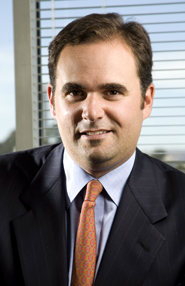Brett Mock, a senior sales trader, is finishing his term as chairman of the Security Traders Association. Mock offers his views on issues that the trading industry has dealt with during his tenure.

>>On his views regarding high-frequency trading:
I believe more liquidity is good for markets and some HFT strategies add liquidity. We learned in 2008 the consequences of illiquid markets in financial products like CDOs. Only regulators can police effectively for gaming or pattern recognition behavior that could cross the line into something like identity theft. Thus, while the regulator should not be picking winners and losers, rules need to be in place to police for fraud and to protect investors.
>>On hyper-fast trading:
I’m a free market believer and think regulation is a blunt instrument at best, so I’m wary of suggesting the government or a regulator should set a limit. I think this debate should continue and the question should be what, if any speed limit, should be implemented for trading and for quoting. Both sides of this debate have strong arguments. I would point out, though, we do have speed limits on our public highways that I think most reasonable people are comfortable with.
>>On whether another "flash crash" could occur:
The market will always have manias and panics; it’s part of human nature. It’s just that the panics are much faster now like the flash crash. I can’t say there won’t be another flash crash. Our industry can’t afford another structural failure like the flash crash. It destroys investor confidence. We as an industry need to get this right. I think the SEC has been thorough in its study of the cause, yet didn’t report back that it was a result of any one thing.
This presents a challenge. Getting rid of stub quotes and banning naked access is a good start. Trading curbs will help, kind of like when my 3 year old needs a "time out" to cool down. But all of these surgical remedies must be uniform across all equity markets. As I said following the flash crash: there needs to be uniform standards regarding circuit breakers, stock halts and the procedure for cancelling trades. The lack of consistency amongst exchanges regarding these policies does suggest that a regulator needs to provide clear, concise, and consistent guidelines.
>>On the future of market making:
I am a former Nasdaq market maker, so I believe in market making and the liquidity it provides. I compliment those that still make markets because the costs are many, while the benefits are limited. I think if we can define the benefits or advantages of being a market maker, then we could also structure the obligations. The market needs liquidity, including latent liquidity that isn’t just sitting in some complicated quant program or algo. It may also need broker capital to facilitate liquidity. Technology is still only a tool. Humans still make the decisions when it comes to risk.



